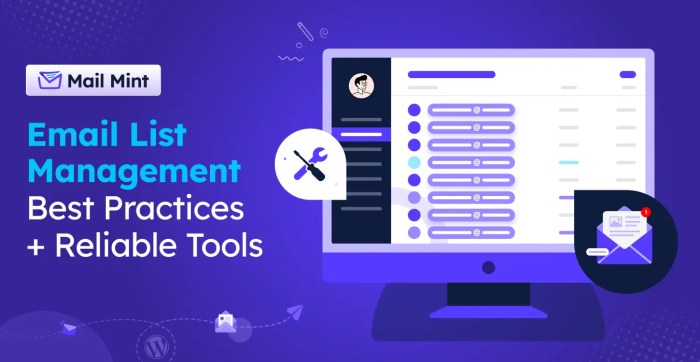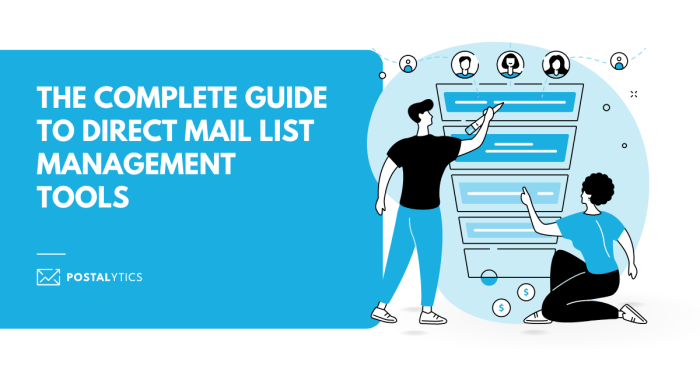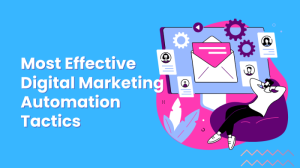
Step into the world of Mailing list management tools where email campaigns are optimized to perfection, making your business stand out in the digital realm. Get ready for a deep dive into the realm of email marketing!
Overview of Mailing List Management Tools
Mailing list management tools are software solutions designed to help businesses effectively manage their email marketing campaigns. These tools provide a range of features and functionalities that simplify the process of creating, organizing, and sending emails to a targeted audience.
Purpose of Mailing List Management Tools
Mailing list management tools serve the purpose of streamlining the email marketing process. They help businesses build and maintain their email lists, segment subscribers based on various criteria, automate email campaigns, track performance metrics, and ensure compliance with regulations such as GDPR.
- Creation and organization of email lists
- Segmentation of subscribers for targeted campaigns
- Automation of email campaigns for efficiency
- Tracking of key performance metrics
- Ensuring compliance with data protection regulations
Importance of Using Mailing List Management Tools for Businesses
Using mailing list management tools is crucial for businesses looking to maximize the impact of their email marketing efforts. These tools help businesses engage with their audience more effectively, improve conversion rates, increase brand loyalty, and ultimately drive revenue growth.
- Enhanced targeting and personalization
- Improved deliverability and open rates
- Efficient campaign management and automation
- Insights into subscriber behavior and preferences
- Compliance with data protection laws
Popular Mailing List Management Tools in the Market
There are several popular mailing list management tools available in the market, each offering unique features and pricing options to suit different business needs. Some of the well-known tools include:
- Mailchimp
- Constant Contact
- AWeber
- GetResponse
- Campaign Monitor
Features to Look for in Mailing List Management Tools
When selecting a mailing list management tool for your e-commerce business, it’s crucial to consider the key features that can enhance your email marketing strategies. From automation to analytics, each feature plays a vital role in effectively managing your subscriber list and driving engagement. Let’s explore the essential features to look for in mailing list management tools and how they can benefit e-commerce businesses.
Automation
Automation is a fundamental feature that allows you to streamline your email marketing campaigns by setting up automated workflows. Look for a tool that offers automation capabilities, such as triggered emails based on subscriber actions, personalized follow-ups, and scheduled campaigns. Automation not only saves time but also ensures that your messages reach the right audience at the right time, increasing the chances of conversion.
- Triggered emails based on subscriber actions
- Personalized follow-up sequences
- Scheduled email campaigns
Segmentation
Segmentation is another crucial feature that enables you to divide your subscriber list into specific groups based on demographics, behaviors, or preferences. By creating targeted segments, you can send personalized content to different audience segments, improving engagement and conversion rates. Look for a tool that offers robust segmentation capabilities to optimize your email marketing efforts.
- Demographic segmentation
- Behavioral segmentation
- Preference-based segmentation
Analytics
Analytics provide valuable insights into the performance of your email campaigns, helping you track key metrics such as open rates, click-through rates, and conversions. Choose a mailing list management tool that offers comprehensive analytics features, including real-time reporting, A/B testing, and campaign optimization tools. By analyzing the data, you can refine your email marketing strategies and improve ROI.
- Real-time reporting
- A/B testing for campaign optimization
- Conversion tracking
Integration with Marketing Strategies
Integrating mailing list management tools into marketing campaigns is essential for businesses looking to effectively reach their target audience and drive engagement. By leveraging these tools, companies can streamline their communication efforts, personalize messages, and track the performance of their campaigns.
Role in E-commerce
Mailing lists play a crucial role in e-commerce by allowing businesses to send promotional offers, product updates, and other relevant information directly to their customers’ inboxes. This direct communication channel helps increase brand awareness, drive traffic to the website, and ultimately boost sales.
Role in Advertising
Successful advertising campaigns often incorporate mailing lists to deliver targeted messages to specific customer segments. By segmenting their mailing list based on demographics, interests, or purchase history, businesses can tailor their ads to resonate with their audience, leading to higher conversion rates and ROI.
Role in Branding
Mailing lists are a powerful tool for building and reinforcing brand identity. By consistently communicating with subscribers through newsletters, updates, and exclusive offers, businesses can strengthen brand loyalty, increase customer retention, and establish themselves as industry leaders.
Data Security and Compliance
In the digital age, data security and compliance are paramount when managing mailing lists. Ensuring the protection of sensitive information and adhering to regulations like GDPR and CAN-SPAM is crucial for businesses to maintain trust with their subscribers.
Importance of Data Security
- Protecting personal information: Mailing lists often contain email addresses and other personal details, making them prime targets for cyberattacks.
- Maintaining trust: By safeguarding data, businesses show their commitment to the privacy and security of their subscribers.
- Legal requirements: Regulations like GDPR and CAN-SPAM mandate certain data protection practices to prevent misuse of personal information.
Ensuring GDPR and CAN-SPAM Compliance
- Obtaining consent: Mailing list management tools facilitate obtaining consent from subscribers in compliance with GDPR regulations.
- Providing opt-out options: Tools allow subscribers to easily unsubscribe from mailing lists, as required by CAN-SPAM regulations.
- Managing data securely: These tools offer encryption, secure storage, and access control features to protect subscriber data.
Best Practices for Data Security
- Regular audits: Conduct routine audits of your mailing list to identify and address any security vulnerabilities.
- Employee training: Educate staff on data security protocols and the importance of safeguarding subscriber information.
- Use secure authentication methods: Implement multi-factor authentication and strong passwords to prevent unauthorized access.
Automation and Personalization

Automation and personalization play a crucial role in email marketing, allowing businesses to streamline their efforts and create targeted campaigns that resonate with their audience on a more personal level.
Streamlining Marketing Efforts with Automation
Automation features in mailing list management tools help businesses save time and effort by automating tasks such as sending welcome emails, birthday greetings, or abandoned cart reminders. This ensures that the right message is delivered to the right person at the right time, without manual intervention.
- Automated drip campaigns based on user behavior
- Scheduled email sends for optimal engagement
- Dynamic content insertion for personalized touch
- Triggered emails based on specific actions
Automation helps businesses stay consistent with their email marketing efforts and ensures that no opportunity is missed to engage with subscribers.
Importance of Personalization in Email Marketing
Personalization is key to creating a meaningful connection with subscribers and increasing engagement. Mailing list management tools allow businesses to segment their audience based on demographics, behavior, or preferences, and send targeted emails that resonate with each segment.
- Personalized subject lines and content based on user data
- Dynamic content blocks for tailored messages
- Recommendation algorithms for product suggestions
- Personalized sender names to increase trust
Personalization not only increases open and click-through rates but also helps build brand loyalty and long-term relationships with customers.
Examples of Personalized Campaigns
- A clothing retailer sending personalized recommendations based on past purchases and browsing history.
- A travel company sending tailored destination suggestions based on previous bookings and interests.
- An e-commerce store sending birthday discounts or anniversary offers to loyal customers.
- A software company sending personalized onboarding emails to new users based on their usage patterns.
Reporting and Analytics

Reporting and analytics play a crucial role in evaluating the effectiveness of email campaigns. By analyzing data and metrics, businesses can gain insights into subscriber behavior, engagement rates, and overall campaign performance. This information is invaluable for making data-driven decisions and optimizing future marketing strategies.
Key Metrics to Track
- Open Rate: This metric measures the percentage of recipients who opened the email. A high open rate indicates that your subject line and content are engaging.
- Click-Through Rate (CTR): CTR measures the percentage of recipients who clicked on a link within the email. It shows how effective your call-to-action is.
- Conversion Rate: Conversion rate tracks the percentage of recipients who completed a desired action, such as making a purchase or signing up for a webinar.
- Bounce Rate: Bounce rate measures the percentage of emails that were not successfully delivered to recipients’ inboxes. A high bounce rate can indicate issues with email list quality.
Optimizing Marketing Strategies
Analytics data can be used to optimize future marketing strategies by identifying trends, patterns, and areas for improvement. For example, if a particular subject line consistently leads to higher open rates, you can replicate that success in future campaigns. By analyzing conversion data, you can refine your targeting and messaging to better resonate with your audience. Overall, reporting and analytics provide valuable insights that can help businesses make informed decisions and maximize the impact of their email marketing efforts.
Comparison of Mailing List Management Tools
When it comes to choosing the right mailing list management tool for your business, it’s essential to compare the pros and cons of different options available in the market. Factors like pricing models, user-friendliness, and customer support can greatly impact your decision. Let’s dive into a comparison of some popular mailing list management tools to help you make an informed choice.
Mailchimp
- Pros:
- Free plan available for beginners
- Intuitive user interface
- Extensive integration options
- Cons:
- Pricing can be high for larger lists
- Limited automation features in the free plan
Constant Contact
- Pros:
- Great customer support
- User-friendly interface
- Good selection of templates
- Cons:
- Higher pricing compared to competitors
- Some advanced features require additional payment
ConvertKit
- Pros:
- Focus on creators and bloggers
- Easy to use automation features
- Visual automation builder
- Cons:
- Can be expensive for larger lists
- Limited template options
AWeber
- Pros:
- Good for beginners
- Wide range of integrations
- Excellent customer support
- Cons:
- Interface can be outdated
- Higher pricing for advanced features
Last Word
As we wrap up our journey through the realm of Mailing list management tools, remember that the key to successful email campaigns lies in harnessing the power of these tools to engage your audience and drive conversions. Get ready to revolutionize your email marketing strategy!
FAQ
How do mailing list management tools benefit businesses?
Mailing list management tools help businesses streamline their email campaigns, target specific audiences, and track the effectiveness of their marketing efforts.
Can mailing list management tools ensure data security?
Yes, these tools ensure data security by complying with regulations like GDPR and CAN-SPAM, providing a secure environment for managing customer data.
What role do analytics play in email marketing?
Analytics help businesses evaluate the performance of their email campaigns, track key metrics, and optimize future marketing strategies based on data insights.





